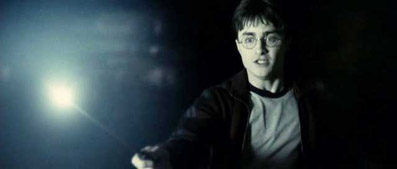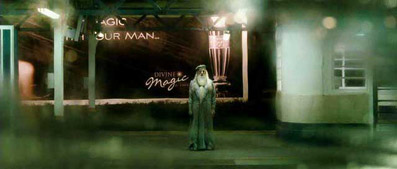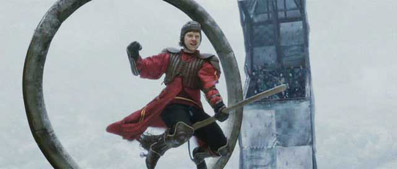Then, anyone who's seen say, Thor or Green Lantern, will recognise
that creeping sensation that you're watching something that has been
created specifically for some strange hybrid global adolescent who
hasn't quite mastered his fourth form English lessons. The cruel
commercial paradox here is that the quintessential American art
form – the Hollywood movie – is now being made primarily for
non-American audiences." |
Kevin Maher, The Times T2 Arts, 22nd July 2011 |
| "Have you heard of Harry Potter?" |
| An e-mail from a friend in the summer of 1999 |
While there were small pleasures to be gained from Thor and less so from The Green Lantern, there was a very good reason I didn't review them. I cannot enthuse over all of Outsider's de rigueur three pages on a diet of small pleasures. I could hardly exhort anyone to see Thor because of two beautifully judged pratfalls or toddle off to see space dreadlocks menace a torso in a green suit just because... I'm struggling. My memories of Lantern are at best, hazy. It's not cynicism to point out that telling a story is, and in some ways always has been, subservient to the selling of a story when it comes to mainstream American film-making. Yes, you have your hero-director voices that pierce the gloom of homogeny once or twice a summer season but on the whole, the tail is not only wagging the dog, it's neutering it too. In the article quoted above, Kevin Maher bemoans the dearth of originality and the demise of the auteur's voice acknowledging that Hollywood – in a breathless irony – now has to satisfy other cultures more than its own while peddling uniquely American values. Didn't they try that in Iraq? Yes, a great percentage of those values are universal – most cultures have adopted fairness as a way of life even if their governments and religions have not. I can't wait to see the box office returns for Captain America in Bagdad...
But the most startling inclusion was the quote from John Lassiter, Pixar head honcho and now Disney's very own Chief Creative Officer. Despite Disney execs having nothing to contribute to the debate on this film-making trend on the record for Maher's article, Lassiter admitted that the globetrotting he did on a press junket inspired the Cars sequel. This could have been an innocent remark (after all, we all get inspired by our experiences) but Maher hints that it's the globetrotting, the pandering to 'the rest of the world...' that's more important than the story about the globetrotting. Oddly, Cars is the only one of Pixar's output that I find difficult to embrace and will not be sprinting to the head of the sequel queue (and my son seems to be of the same mind but then he is now 15 and perhaps too old for the shiny bright colours and cosy moral universe Lassiter's cars inhabit).

But more than this casual gear change, I was struck by another movie event this month, the end of something quite extraordinary and that ending seemed the ultimate ironic metaphor for the industry itself. Just as the individual loses his/her voice in the mainstream of Hollywood, so does the heroic individual finally triumph over evil in a film series that has been remarkably successful and creatively canny in its ongoing and ingenious lifetime. It wasn't only the young stars that grew in front of our eyes; it was the franchise itself. Franchises are based on repetition. This was the only one I know of that psychologically grew with its audience. I've never seen a film series mature. I've seen a few infantilize in front of me but none actually grew. Say what you will about the series itself but the only real trouble with Harry is that there is no more Harry.
There is a woman on this planet that possesses the most astonishing power. OK. Perhaps she doesn't own an invisibility cloak, a stone to bring back the dead or a stick that when waved and coupled with some semi-cod-Latin incantations, can rip open the universe... But in Hollywood terms, she could sneeze into a tissue and Warner Brothers would not necessarily insist on a rewrite. They'd happily produce it and with some difficulty market it to a ready made audience just begging for more. With her seven books, she has kept a major Hollywood studio afloat and even surfing for an entire decade. Whatever fiction Jo Rowling writes from now on, she will be judged against a meta-successful yardstick that no human being can compete with – but rest assured, Warner Brothers will be there, bank transfer in situ. The Harry Potter franchise is dead. Long Live the Harry Potter franchise...
Harry Potter and the Deathly Hallows Part 2 is by no means a great film but it is the solid, craftsperson-like last part of a great saga. There's more irony in that the last one of the pair based on the final book deviates more from its source than any other in the series. Why ironic? It's because these are the only two movies with author Jo Rowling on full producer duty. How she let certain scenes drop out of the screenplay and how certain events deviate from the book isn't quite beyond me because I understand the compromise of adaptation but still, no Harry in Dumbledore's office telling the assembled portraits what he intends to do with the Hallows? Ouch. Snapping the Elder Wand in half and dropping it over the battlements of Hogwart's Castle just seemed silly and worse, dramatically incomplete. How's he going to repair his broken wand now? The last pages of the book, the extraordinary pay offs and emotional beats, the action scenes and character revelation are stacked like soon-to-be falling dominoes. In the movie, the bigger events are showcased but there are few satisfying moments, moments that clatter around you as you consume the pages. Voldemort's death on screen is almost surreal, like seeing Luke Skywalker's laser blast dance around the Death Star exhaust port before it pops in. In the book, the phrase used is "Tom Riddle hit the floor with a mundane finality..." There's none of this splitting into bits and floating off nonsense. A friend of mine in the business begged me to leave before what he called the 'Spielbergian' coda (which is in the book, almost word for word). But if it was in the book, it seemed OK to me.

What's any opinion worth now on a movie that has just pulverised box office records? At the time of writing it's not even a week old and it's past the half a billion mark. And to me, it's clearly the result of a tactical bludgeon of marketing, amazingly popular source material across the globe, solid and assured modern film-making, the fact that it's the last of the eight and (dare I say it) it has had the possession of an authorial spirit from day one (even if you don't like the author in question). Debate all you like but the 19 hours and 38 minutes of Potter on screen are unquestioningly the work of a single author interpreted by highly talented directors, craftspeople, actors and a producer in constant attendance keeping the ship sailing in the right direction. And no, it's not too critical to suggest that the franchise could also be seen as a one and a half billion dollar, decade long acting lesson for the young leads. Apparently Warner execs were happy to let David Heyman take care of producing duties and it was in Rowling's contract that the whole shebang be UK based using UK talent. Heyman optioned the first book before publication so bravo to him (and his assistants who brought the book to his attention) for seeing something, a spark of what would go on to be something rather unique. Warner Brothers, like Potter publishers Bloomsbury, will never have a decade like the one they've now put to bed.
Imagine being a Warner Brothers Executive in the late 90s...
"What? You're saying Heyman's optioned them and is looking to the US to do a deal? No Brit or UK based company has stepped up to the plate? Are they nuts? Not one entrepreneur in the UK is willing to put forward – granted - a small fortune to fund the first to generate billions on what must be the surest thing since The Phantom Menace? Is that mud island full of wusses, or what? Steven wants The Sixth Sense kid but Rowling won't have an American Potter. Make an offer. Get Columbus to schmooze her, see how it goes... but get her signed up."
Well, we all know how it went. After some very delicate and one sided terms and conditions, Jo Rowling got her way and put key Brit producers in charge of her baby and successfully located the Potter juggernaut just off the M25 in Leavesden soaking up a considerable percentage of British talent in front and behind the camera for the next ten years. I will always remember the moment I realised that Warner Brothers had played their hand so well. In an interview, Chris Columbus (director of the first two) admitted that he had expected Rowling to be an Enid Blyton middle-to-old aged type writing modestly in her little cottage. But (as he found out), the attractive and vivacious 34-year old "...had the same albums I had." This is significant in all sorts of ways. Jo Rowling, if Jeremy Paxman's picture editor on his Pre-Book 5 Release Newsnight is to be trusted, is a smart, sensitive soul who has worn fame with intelligence, genuine shock and grace. Her charity work is enough for me to regard her with respect, let alone the fact she has kept my family and myself thoroughly entertained for years. If there is any doubt about this talented writer's command of narrative, read Deathly Hallows and then immediately read Philosopher's Stone – it's like interlocking fingers. It's proof that she had everything in place from book one, page one. In modern narrative terms, this is extraordinary and from a reader's point of view, it is immensely satisfying.

For a site that principally celebrates the relatively unsung in cinema, I admit it feels a little odd writing about the most lucrative franchise in cinema history but it has recently come to an end. Every now and again, we do review a bloated Hollywood blockbuster, acknowledging that this rarefied and ubiquitous form of our beloved craft exists and is not necessarily unworthy of some attention. Having said this, I had no argument from two 15 year olds after I made a casual and cynical remark in the car on the way home from Horrible Bosses. "Why have we left the cinema after every film this summer as if we'd accidentally run over a cat?" Cinema should inspire not be insipid. Having small fortunes to play with doesn't instantly mean committee-made consumer friendly movies (but on the whole based on this summer alone, this could be a current industry truism). But then as a business, you don't succeed appealing to a minority. I understand the childish logic of a business existing to make a profit but what is cinema without a point of view? It's essentially a firework display at best and at worst incoherent, soulless pap.
After a decade of consistent storytelling it's worth a little time assessing Harry Potter's impact and effect on the much-beleaguered British film industry while all the profits head off to the US. A few years ago, both Slarek and I came to the same conclusion from very different points of view. It was, in short, that corporate studio film-making was not really worth our time any more, so homogenised had the offerings become. Yes, there's a Disney backed Tim Burton movie here and a Columbia financed David Fincher movie there but essentially, the bigger budget movies are now PR'ed to gloop and a film-maker's voice is so hard to discern from the multi-executive braying that tries to widen their films' appeal as much as possible. This was never true about the Harry Potter franchise although I'm sure executives tried like hell to get product placement deals. But in Harry's game, the story for once is king. The movies were there to serve one seven-year narrative and what a trip it's been.
The juggernaut that is the cinematic interpretation of the imagination of Jo Rowling has come to an audience-pleasing halt. The Hogwart's Express has puffed its last. Yes, there are DVDs, Blu-rays, theme parks and more Potter on the way from 'pottermore.com' and enough cuddly Hedwigs and Hermione and Ron heart embossed vacuum flasks on sale to confirm to the hardest bitten cynic that the whole phenomenon has been stage managed and squeezed dollar-dry from day one. But at its heart is a great, some might say, epic story and at the story's own heart, a truly marvellous storyteller. And if an enlightened Hollywood needs anything to keep the voracious appetites of its audiences sated (on US soil or abroad) it needs great, original voices.
I give you the Executive's Prayer...
Our Franchise, the art from Leavesden
Deathly Hallows be thy name
Why, no Quidditch game
Played near earth as it is in the heavens
Give us this opening day, our daily overhead
And forgive us our free passes
As we forgive those who market against us
And lead us not into litigation
And deliver us from Riddle's evil
For JK's is our Kingdom
The power behind our Harry
Forever and ever (all rights in perpetuity)
Amen...
|